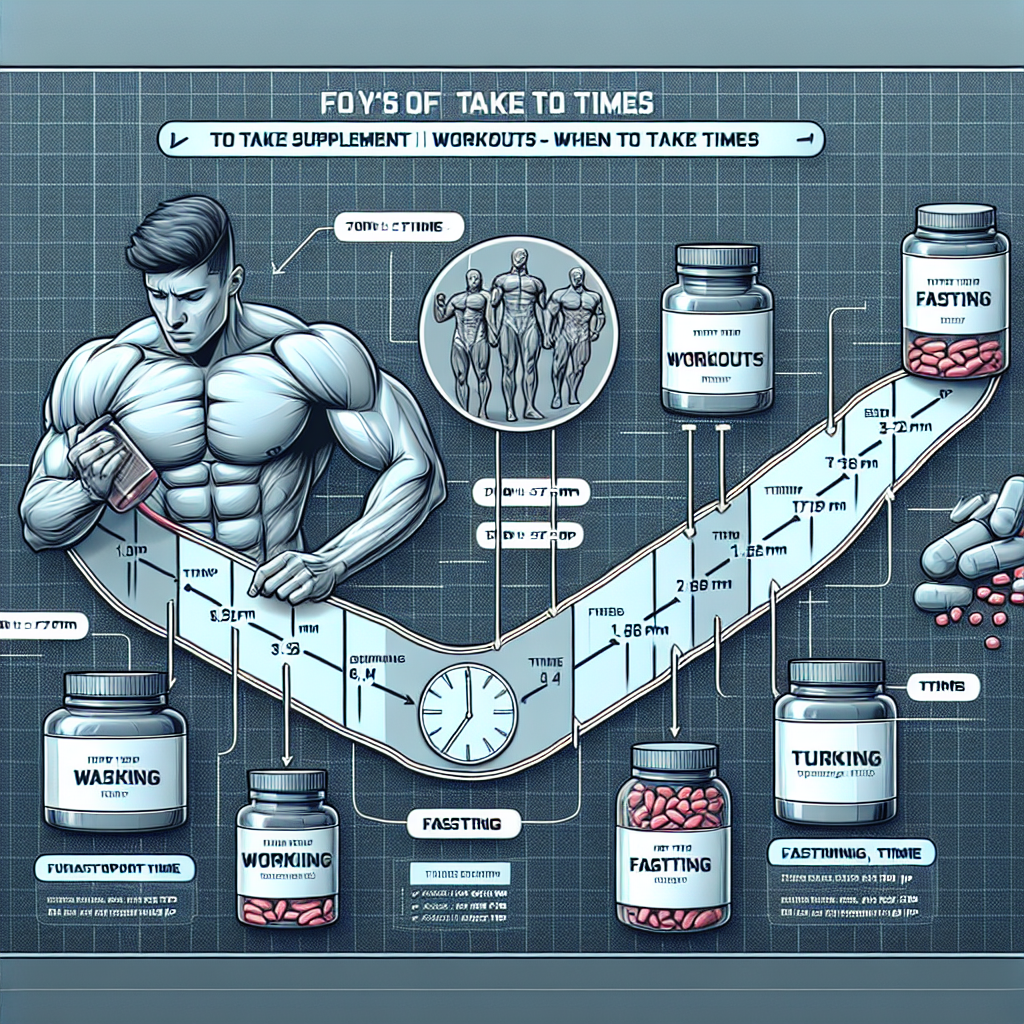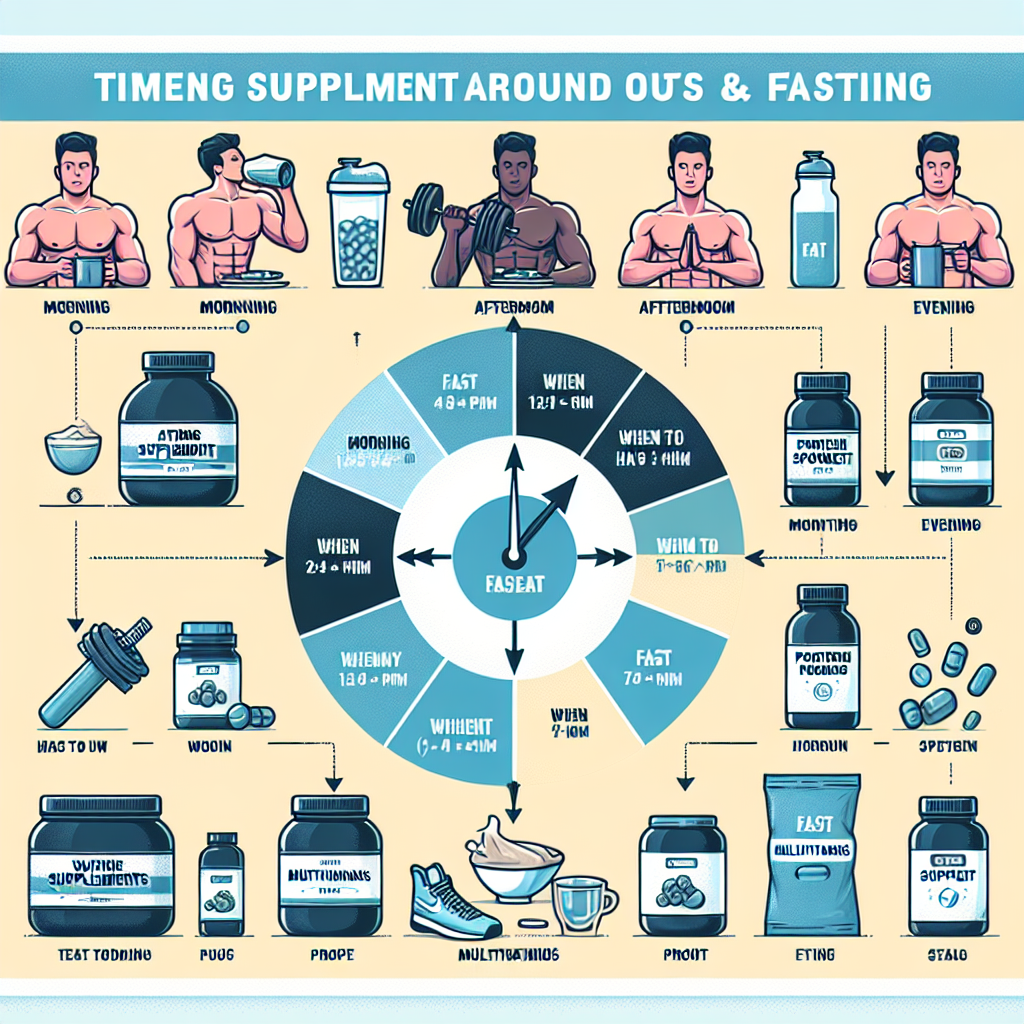How to Time Supplements Around Workouts and Fasting

Discover the best ways to time your supplements around workouts and fasting. Learn the optimal times to take your supplements for maximum effectiveness. Don’t miss out on this crucial information that could enhance your fitness journey. Visit My Vibrant Vitality now to get started.
Maximizing Workout Results: Timing Your Supplements Effectively
Maximizing the results of your workout routine involves more than just the exercises you perform. It also includes the food you eat, the amount of rest you get, and the supplements you take. In particular, the timing of your supplements can significantly impact your workout results, especially when combined with fasting.
To begin with, it’s important to understand the role of supplements in your workout routine. Supplements are designed to provide your body with the nutrients it needs to perform at its best. They can help to increase your energy levels, improve your endurance, and speed up your recovery time. However, to get the most out of your supplements, you need to take them at the right time.
For pre-workout supplements, the ideal time to take them is 30 minutes to an hour before your workout. This gives your body enough time to absorb the nutrients and use them during your workout. Pre-workout supplements often contain ingredients like caffeine and beta-alanine, which can help to increase your energy levels and improve your performance.
On the other hand, post-workout supplements should be taken immediately after your workout. These supplements are designed to help your body recover from the stress of exercise. They often contain ingredients like protein and amino acids, which can help to repair muscle tissue and reduce muscle soreness. Taking these supplements immediately after your workout ensures that your body has the nutrients it needs to start the recovery process.
In addition to timing your supplements around your workouts, you may also want to consider timing them around your fasting periods. Fasting has become a popular dietary strategy for many people, and it can have a significant impact on how your body uses supplements.
When you’re fasting, your body is in a state of calorie restriction. This means that it’s using stored fat for energy instead of the food you’re eating. As a result, your body may be more receptive to certain supplements during this time.
For example, supplements that contain branched-chain amino acids (BCAAs) can be particularly beneficial during fasting periods. BCAAs are a type of amino acid that your body can use for energy. Taking BCAAs during your fasting period can help to prevent muscle breakdown and improve your energy levels.
However, it’s important to note that not all supplements are beneficial during fasting periods. Some supplements, like those that contain caffeine, can actually break your fast. Therefore, it’s important to carefully consider the ingredients in your supplements and how they may impact your fasting period.
In conclusion, timing your supplements effectively can help to maximize your workout results and enhance the benefits of fasting. By taking pre-workout supplements before your workout and post-workout supplements after your workout, you can ensure that your body has the nutrients it needs to perform at its best and recover quickly. Additionally, by timing certain supplements around your fasting periods, you can further enhance your body’s ability to use these nutrients. However, it’s important to always consider the ingredients in your supplements and how they may impact your fasting period.
The Art of Fasting: How to Schedule Supplements for Optimal Health

The art of fasting, when combined with a well-planned supplement regimen, can significantly enhance your health and fitness goals. However, timing is crucial in this delicate balance to ensure optimal absorption and effectiveness of the supplements. This article will guide you on how to time your supplements around workouts and fasting for optimal health.
Fasting, a practice that dates back centuries, has gained modern-day popularity for its potential health benefits, including weight loss, improved mental clarity, and longevity. However, fasting can also lead to nutrient deficiencies if not properly managed. This is where supplements come into play. They can fill nutritional gaps and provide the body with essential nutrients it may lack during fasting periods.
When fasting, it’s important to remember that the body is in a state of nutrient conservation. Therefore, taking supplements during this period may not yield the desired results as the body’s absorption capacity is reduced. The best time to take supplements is during your eating window when your body is primed for nutrient absorption.
For instance, fat-soluble vitamins such as A, D, E, and K are best taken with meals to enhance absorption. Similarly, minerals like iron and calcium are better absorbed when taken with food. Therefore, timing these supplements around your meals during your eating window can significantly improve their effectiveness.
On the other hand, water-soluble vitamins such as B and C can be taken on an empty stomach. However, they are quickly excreted from the body, so it’s best to take them close to your eating window to ensure they are utilized effectively.
When it comes to timing supplements around workouts, the focus shifts from nutrient absorption to performance enhancement and recovery. Pre-workout supplements, often containing ingredients like caffeine and beta-alanine, are designed to boost energy and endurance. These should be taken 30 minutes to an hour before your workout to allow time for the ingredients to take effect.
Post-workout supplements, on the other hand, are designed to aid recovery. These often contain protein and amino acids to help repair and build muscle. It’s best to take these immediately after your workout when your muscles are primed for nutrient uptake.
However, if you’re fasting and working out, the timing can get a bit tricky. It’s recommended to schedule your workouts towards the end of your fasting period. This way, you can take your post-workout supplement, which often breaks your fast, and then move into your eating window where you can continue to nourish your body with meals and other supplements.
In conclusion, the art of fasting and supplement timing revolves around understanding your body’s nutrient needs and absorption capacity. By timing your supplements around your workouts and eating windows, you can ensure that your body gets the most out of each supplement. Remember, everyone’s body is different, so it’s important to listen to your body and adjust your supplement timing as needed. Always consult with a healthcare professional before starting any new supplement regimen, especially if you’re combining it with fasting.
Balancing Workouts and Fasting: A Guide to Supplement Timing
Balancing workouts and fasting can be a challenging task, especially when it comes to supplement timing. However, with a little knowledge and planning, you can optimize your supplement intake to support your fitness goals and fasting schedule.
Firstly, it’s important to understand the role of supplements in your fitness journey. Supplements are designed to fill in the nutritional gaps in your diet, providing your body with the necessary nutrients to perform at its best. They can help enhance your performance, speed up recovery, and support muscle growth and repair. However, the timing of your supplement intake can significantly impact their effectiveness.
When it comes to workouts, the timing of your supplements can be divided into three main categories: pre-workout, intra-workout, and post-workout. Pre-workout supplements, as the name suggests, should be taken before your workout. They typically contain ingredients like caffeine and beta-alanine to boost your energy levels and endurance, helping you push through intense workout sessions.
Intra-workout supplements are taken during your workout. They usually contain essential amino acids and electrolytes to support muscle function and prevent dehydration. Post-workout supplements, on the other hand, are taken after your workout. They often contain protein and carbohydrates to aid in muscle recovery and replenishment of glycogen stores.
Now, let’s consider the impact of fasting on supplement timing. Fasting is a practice that involves abstaining from eating for a certain period. It has been shown to promote weight loss, improve metabolic health, and even extend lifespan. However, fasting can also affect your body’s ability to absorb and utilize supplements.
During a fast, your body is in a state of calorie restriction. This means that it may not have the necessary energy to effectively process and absorb certain supplements. Therefore, it’s generally recommended to take your supplements during your eating window, when your body is better equipped to handle them.
However, there are exceptions to this rule. Some supplements, like branched-chain amino acids (BCAAs), can be taken during your fasting window without breaking your fast. BCAAs are a group of essential amino acids that play a crucial role in muscle protein synthesis. Taking BCAAs during your fast can help prevent muscle breakdown and enhance your workout performance.
In conclusion, the timing of your supplement intake should be tailored to your individual needs and lifestyle. If you’re balancing workouts and fasting, it’s crucial to plan your supplement intake around your eating and workout schedule. Pre-workout and intra-workout supplements should ideally be taken before and during your workout, respectively, while post-workout supplements should be taken after your workout. If you’re fasting, try to take your supplements during your eating window, unless they’re fasting-friendly like BCAAs. Remember, supplements are meant to support your diet and exercise routine, not replace them. Always consult with a healthcare professional before starting any new supplement regimen.